by Naomi L. | February 5, 2014 | Blog, Creative Writing |
Language is a beautiful thing. We use it every day to translate our thoughts and convey our feelings to our fellow human beings, and that has undoubtedly helped us to progress as a species. But the use of language is not without its flaws; words get mixed up and can be misunderstood if people don’t know how to use them properly. So just for fun, here are four words that are commonly misused in speech and/or writing in the English language. Enjoy!
1) If you have a question, please don’t “axe” me…
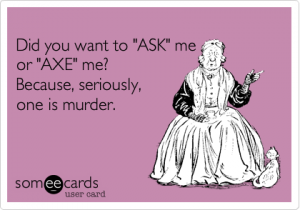 OK, I know people aren’t really trying to say “axe” in this context, but the common mispronunciation of the word “ask” still bothers me enough to warrant a place on this list. I admit that I cringe a little whenever I hear someone say they want to “aks” a question; every time, the editor in my head screams “Ask! Ask! ASK!” Yes, I understand that people in different regions have different ways of speaking, and old habits are hard to break. But that doesn’t make this mistake OK.
OK, I know people aren’t really trying to say “axe” in this context, but the common mispronunciation of the word “ask” still bothers me enough to warrant a place on this list. I admit that I cringe a little whenever I hear someone say they want to “aks” a question; every time, the editor in my head screams “Ask! Ask! ASK!” Yes, I understand that people in different regions have different ways of speaking, and old habits are hard to break. But that doesn’t make this mistake OK.
So if you have a question, please don’t “axe” me. I don’t want to die.
2) “Defiantly” is not an alternative spelling for “definitely”.
Of all the spelling mistakes I come across regularly, this is one of those that bug me the most. Every time I see it made, a part of me wants to explain to the so-called language offender that “defiantly” and “definitely” are two completely different words that should never be confused. But people probably don’t notice the mistake because the spellings are so similar, or worse, they assume that one word is the same as the other because the error is so common.
Remember: “defiantly” means “showing open resistance”, while “definitely” means “without doubt”. Hopefully you can “definitely” love someone, but you don’t have to love them “defiantly”!
3) “Ironic” doesn’t mean what you probably think.
I’ve noticed that people sometimes like to use the word “ironic” as a synonym for “sarcastic”. But even though these adjectives have similar meanings, they’re not actually interchangeable, at least in a formal sense. Yes, the definition of “sarcasm” is “the use of irony to mock or convey contempt”, but the uses of these words in speech are still distinct. The best known meaning of the word “ironic” is “happening in the opposite way to what is expected”. Thus, irony is often used as a more harmless humor technique compared to sarcasm.
So whenever you describe an event as “ironic”, you may want to consider whether you really mean “sarcastic”, or vice-versa. ‘Cause you know, it’s sooo ironic when human beings make mistakes.

Even Windows has a sense of irony…
4) If you had “literally” died, you wouldn’t be here to tell the story!
Ryan: Did you see that? What just happened? That was literally a train wreck!
Steven: No, Ryan, it was figuratively a train wreck.
– Go On (Season 1, Episode 12 – “Win at All Costas”)
We all probably know someone who tends to overuse the word “literally” when speaking. “It was literally the best pizza in the world!” “It’s literally a million degrees today!” “The interview was literally a train wreck!” Over time, the word has become a common adverb for conveying exaggeration. However, although it’s technically acceptable in an informal way, “literally” shouldn’t really be used for emphasis, as it means “in the exact sense, without metaphor or allegory”.
So no, the wasp was not “literally” the size of a helicopter. No, you did not “literally” jump out of your skin at the sight of it. And no, you did not “literally” die of embarrassment when everyone laughed at you for running away. Otherwise, the military would be after that giant insect, you’d be an undead heap of raw meat and bones, and everyone would be feeling a horrible mix of confusion and guilt for having killed you with laughter!
What are your thoughts on these misused words? Any others you would add to this list?
by Naomi L. | November 6, 2013 | Blog, Creative Writing |
All native English speakers are familiar with this problem: words and phrases that appear similar in spelling, pronunciation or meaning, but that actually have distinct definitions. This, of course, can cause some confusion when writing. After all, it’s not always easy keeping track of the right words for the context we want, and even the most proficient writers make mistakes. But nobody’s perfect, right?
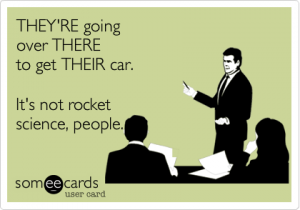 To help you avoid some common (and a few uncommon) grammar pitfalls, here are 25 examples of words and phrases you may be getting mixed up in your writing. Almost all of these items were taken from The Hodges Harbrace Handbook, an excellent resource for beginning and advanced writers alike. Be sure to check it out if you can! Write wisely!
To help you avoid some common (and a few uncommon) grammar pitfalls, here are 25 examples of words and phrases you may be getting mixed up in your writing. Almost all of these items were taken from The Hodges Harbrace Handbook, an excellent resource for beginning and advanced writers alike. Be sure to check it out if you can! Write wisely!
1) accept/except
It’s easy to confuse these words because they sound so similar, but they have very different definitions. “Accept” is a verb that means “to receive with consent”; “except” is a preposition that means “other than”. “Except” is also a verb meaning “to exclude”.
I accept all apologies, except those that aren’t heartfelt.
2) affect/effect
These words are so easy to mix up that I always stop and double-check if I’m using the right one before I move on. “Affect” is a verb meaning “to make a difference to”; “effect” is a noun meaning “result of a cause”. As a verb, “effect” means “to cause”.
The effect that book had on my friend’s life did not affect my opinion of it.
3) among/between
Here’s an example of two words that seem similar in meaning, but that aren’t usually interchangeable because their uses depend on context. Generally speaking, “between” is exclusively for referring to two entities, while three or more should be referred to using “among”.
Between the two of us, I don’t see any love among the three band members.
4) anymore/any more
Who among us hasn’t once mistakenly inserted a space where it wasn’t necessary (or omitted one where it was)? I’m sure we’ve all had our doubts about the difference between “anymore” and “any more”. As one word, “anymore” means “any longer”, while as two, “any more” is used with a negative to mean “no more”.
Do not give me any more problems, or I won’t have the patience to deal with you anymore.
5) can/may
Did anyone else’s parents use to answer the question “Can I?” with “You can, but you may not”? No? Just mine? OK, then. Basically, by answering sarcastically, my parents were teaching us the proper way to ask if we were allowed to do something, as “can” refers to ability while “may” refers to permission.
You can drive 80 miles an hour, but you may not go over the speed limit.
6) coarse/course
Here’s a pair of homophones that are especially easy to get confused because they only differ by one letter. “Coarse” is an adjective that means “rough”, but “course” is a noun that means “route” or “plan of study” (or a verb that means “move without obstruction”).
We’ll need a new course of action if we want to make this coarse piece smooth.
7) complement/compliment
This is another pair of words that sound alike and differ by one letter. Don’t let these verbs confuse you, though. “Complement” means “to complete”, and “compliment” means “to express praise”. Be sure to check which letter you’re using!
I had to compliment her on how well her piece was able to complement mine.
8) elicit/illicit
This mistake is a little less common, but still possible to make due to similar spelling. “Elicit” is a verb meaning “to evoke a response”, and “illicit” is an adjective meaning “illegal”.
She was quick to elicit objections from her peers by talking about her boyfriend’s illicit actions.
9) eminent/imminent
I’ve actually never made this mistake myself because I’m not too familiar with the word “eminent”, but I still think it’s worth mentioning. Though both are adjectives, “eminent” means “distinguished”, and “imminent” means “about to happen”.
For such an eminent artist, worldwide success was imminent.
10) everyday/every day
Oh, those darn spaces, always confusing us! Here’s another mistake we have to watch for, because a single space does change the meaning behind the words! “Everyday” as one word means “commonplace” or “routine”, but “every day” as two words means “each day”.
Every day, I have to help my sister deal with her everyday problems.
11) explicit/implicit
This one might not be very common, but it’s still an important mistake to note, because even though these two adjectives seem similar, they have opposite meanings. “Explicit” means “stated clearly”, while “implicit” means “expressed indirectly”. Make sure you’re not saying the opposite of what you mean!
By using explicit details, the director makes the message of the movie implicit.
12) farther/further
These adverbs may seem interchangeable, but which one you should use actually depends on context. Both are comparatives of “far”, but “farther” is used to refer to geographic distance, while “further” is used to mean “more”.
We’ll need further assistance if we’re to travel farther tomorrow than we did today.
13) fewer/less
I added this example to the list because it’s common for writers to go straight for “less” when indicating lower amounts. Like the cases of “among”/”between” and “farther”/”further”, however, context is important. Though both words mean the same thing, “fewer” is for nouns that can be counted, while “less” is for nouns that can’t.
Since I started outlining my novel, I have fewer blank notebook pages and much less free space on my desk.
14) good/well
Colloquial speech has made it very common for people to mix up the proper uses of “good” and “well”. I can attest to this from personal experience; knowing the difference between “good” and “well” doesn’t keep me from answering “How are you?” with “Good”. But even though they mean the same thing, there’s a difference: “good” is an adjective and “well” is an adverb. Make sure you aren’t confusing them!
A good writer knows how to tell stories well.
15) its/it’s
What’s a list of common grammar mistakes without a few examples of “contraction confusion”? We’ve all been guilty of this error before, but it’s understandable when one apostrophe makes all the difference. “Its” is the possessive form of “it”, and “it’s” is the contraction of “it is”. Careful with that apostrophe!
It’s easy for students to struggle with English and its many grammar rules.
16) lay/lie
This is one mistake I always have to take extra care not to make, because the past tense of one is the present tense of the other! The main difference between these verbs is that one takes an object while the other doesn’t. “Lay” means “to put (something) down”; “lie” means “to rest”.
I have to lay my things on the desk before I can lie down.
17) raise/rise
This is a tough mistake to make, but I’m fairly certain I’ve seen it happen before. Like the previous example, the difference between these verbs is that one is transitive and the other is intransitive. “Raise” means “to lift (something) up”, while “rise” means “to ascend”.
The teacher made me raise my hand and ask permission before I could rise from my chair.
18) sometime/some time
Yes, it’s another case involving a space (sorry for the lame rhyme). Whether you write it as one word or two will alter the meaning of the sentence. “Sometime” as one word means “at an unspecified time”, and “some time” as two words indicates a span of time.
Sometime next month, we’ll be able to spend some time together.
19) than/then
These are two words that I constantly mix up by accident, to the point where I always read the sentence at least three times to make sure I used the right one before moving on. “Than” is a conjunction and preposition used in comparisons; “then” is an adverb indicating a time sequence. Always be sure to double-check!
Back then, he used to say he’d rather listen to underground rock than mainstream pop music.
20) their/there/they’re
Here it is: the famous trio! You didn’t think I’d leave this one out, did you? Self-proclaimed “Internet grammar police” love picking on people for this mistake, and although I sympathize with those who commit the error once in a while, I can’t forgive those who insist on interchanging these words without any respect for the English language. “Their” is the possessive form of “they”; “there” is an adverb referring to location; and “they’re” is the contraction of “they are”. Be careful with your word choice!
They’re going there to retrieve their test scores.
21) to/too/two
Here’s another famous word trio. When one letter makes all the difference, it’s very easy to mix these words up. “To” is a preposition and infinitive marker; “too” is an adverb meaning “also” or “excessively”; and “two” is a number.
Two mistakes in your essay are still too many if you hope to ace this test.
22) weather/whether
This one may seem unlikely, but I swear I’ve seen writers mix up these words before. “Weather” is a noun referring to the state of the atmosphere (and sometimes a verb meaning “to wear away”); “whether” is a conjunction indicating a choice between alternatives. Make sure you’re using the right word!
Whether or not you believe in climate change, you can’t deny that the weather has been strange lately.
23) who/whom
We all know that person who insists on correcting us when we use “who” incorrectly (my family does for sure, because it’s me). Which word you use depends on voice: “who” is used as a subject, while “whom” is used as an object. When in doubt, try rewording the phrase with “he/she” (subject) or “him/her” (object).
To whom it may concern, I’m the one who let the birds out of the cage.
24) whose/who’s
Speaking of “who”, here’s another pair of homophones that are easy to confuse. Even I sometimes have to go back and fix the mistake. “Whose” is the possessive form of “who”, and “who’s” is the contraction of “who is”.
Whose fault is it if we can’t figure out who’s responsible for this mess?
25) your/you’re
And now for the final pair of easily confused words: the famous “your” and “you’re”. Friends fans, remember that moment when Ross is fighting with Rachel over the letter she wrote him, and points out her grammar error for good measure? Yes, he was drawing attention to a mistake that many people are guilty of making at least once in their writing. But we all know which word is which: “your” is the possessive form of “you”, and “you’re” is the contraction of “you are”. The trick is making sure we’re using the right one!
You’re not going anywhere until your homework is done!
These are just some of the many examples of easily confused words in the English language. Yes, an innocent mistake now and then is forgivable; our grammar is so complex that even native speakers struggle with it from time to time. Still, as writers, we should take care to avoid these mistakes as much as possible. If nothing else, we should be setting a good example for all other English speakers!
What about you? Have you ever confused any of these words and phrases before? What other examples would you add to this list?
by Naomi L. | September 18, 2013 | Blog, Creative Writing, Writer's Toolkit |
Who among us writers hasn’t found themselves doubting at one time or another whether the grammar in our writing was correct? I myself have at least three doubts regarding the previous sentence in this paragraph! We’ve probably all been in this situation before, getting stuck during the editing process over a comma we weren’t sure was correctly placed or the appropriate formatting for a citation. That’s why today’s Writer’s Toolkit review features a nifty handbook designed to aid writers through the trials of editing and revision: The Hodges Harbrace Handbook by Cheryl Glenn and Loretta Gray.
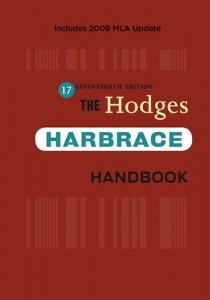
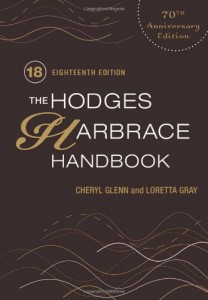
Book Summary
This handbook was one of the required materials for the online creative writing course I took through UC Berkeley. I currently own the 17th edition, published in 2009 with an MLA update, though at the time of writing this review, an 18th edition has already been released (and you can be sure that more will follow).
Originally published in 1941 by English professor John Hodges as the Harbrace Handbook of English, this book has since evolved into one of the richest English writing resources available today. The contents are organized into seven parts:
- Grammar
- Mechanics
- Punctuation
- Spelling and Diction
- Effective Sentences
- Writing
- Research and Documentation
Parts are subdivided into chapters and color-coded for your convenience (sorry, I couldn’t resist). Also included are a preface by the authors outlining new features and revisions for the current edition, a glossary of usage, a glossary of frequently used terms, and an index.
Pros
The first thing one might notice upon opening The Hodges Harbrace Handbook is the table of contents printed right into the back of the front cover and the first pages. At a glance, it’s clear how thorough this manual is, covering as many topics as possible from grammar and mechanics to proper usage of English in college-level writing. The table provides a quick guide to different sections and chapters, which are colored and numbered for easy reference.
As for the actual content, I find the explanations easy to understand, bearing in mind that the book is geared toward college students and above. To add to the educational experience, practice exercises are included within chapters, as are checklists for certain cases that come up in the editing process. Other notable features are the special boxes interspersed throughout the book: “Thinking Rhetorically” invites writers to consider the impact of their writing choices on their target audience; “Multilingual Writers” notes common areas of confusion for English learners, especially those for whom English is not a first language; and “Tech Savvy” provides helpful tips for using word-processing software, a useful feature for writers of the digital age. The last pages of the handbook include indexes for “Multilingual Writers” boxes, checklists and revision symbols.
One of my favorite details about the most recent editions of The Hodges Harbrace Handbook is the update for writers of modern times. As of the 17th edition, a new chapter titled “Online Writing” is included in the “Writing” part of the guide, and revisions reflect updates to MLA and APA guidelines and an expansion to a chapter on using writing software for business. Because of these updates, I would strongly advise against purchasing any edition of this handbook earlier than the 17th, published in 2009.
Cons
Honestly, this list is pretty short. In fact, the first issue I found with this handbook may have been due to error on my part. There were a couple of questions for which I couldn’t find answers in the handbook, either because I was searching for them in the wrong chapters or because they simply weren’t there. Also, the preface mentions some supplemental materials that are only available when bundled with the handbook at an additional cost. Not exactly a downside, but just a point to keep in mind if you’re looking for a complete learning experience to go with this guide.
Oh, and of course there’s the matter of price. A new latest-edition hard copy goes for over $80 on Amazon, which may seem steep to a student who only plans on using it for a semester. On the other hand, a prolific writer who needs to constantly edit and revise their work would probably find any price under $100 quite reasonable. As with any product, it’s all a matter of whether or not you feel you’d be able to get your money’s worth out of it.
Summary
Pros
- Versatile and thorough guide to the English language
- Well-organized contents
- Easy to understand
- In-chapter practice exercises
- Special boxes for “Thinking Rhetorically”, “Multilingual Writers” and “Tech Savvy” tips
- Extra indexes for “Multilingual Writers”, checklists and revision symbols
- Updated edition for writing in the modern age
Cons
- Possible missing information
- Supplemental materials available at additional cost
- Price ($80+ new on Amazon)
Conclusion
I highly recommend this handbook to any writer who puts as much effort into editing as into writing, if not more. Though I purchased my copy as a requirement for a class two years ago, I have since found it quite helpful when revising my work, and continue to use it today. Whether you’re looking for a complete guide to basic grammar or a full learning experience in the English language, The Hodges Harbrace Handbook is a great resource to keep handy, as much for the student writing for college as for the creative individual writing for life.
by Naomi L. | June 26, 2013 | Blog, Creative Writing |
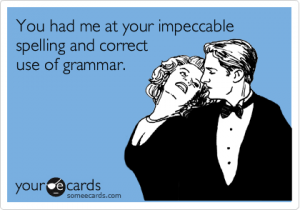 I don’t usually like to get picky about grammar, save for when I’m editing my own writing (or teasing my closest friends). Every now and then, however, I catch a few minor “mistakes” in the writing and speech of others that jump out at me. I use quotation marks because they aren’t necessarily wrong; I just tend to find them a bit odd, and occasionally a little annoying. Maybe there are others who would agree, and maybe sometimes it’s just me being my regular nerdy self.
I don’t usually like to get picky about grammar, save for when I’m editing my own writing (or teasing my closest friends). Every now and then, however, I catch a few minor “mistakes” in the writing and speech of others that jump out at me. I use quotation marks because they aren’t necessarily wrong; I just tend to find them a bit odd, and occasionally a little annoying. Maybe there are others who would agree, and maybe sometimes it’s just me being my regular nerdy self.
Just for fun, today’s topic brings you three random “pet peeves” of mine that are widely accepted as understandable language. You can decide for yourself where you stand on these…
1) When “could” really means “couldn’t”
I admit that it bothers me a little to see people using the phrase “I could care less” when they clearly mean to say “I couldn’t care less”. The logic behind the phrasing is simple: if you “couldn’t care less”, you’ve reached the limit of how little you can care about something, whereas if you “could care less”, there’s still a little part of you that does care and has yet to be eliminated.
I’ve heard a couple of theories as to how the “could” variation emerged in colloquial speech. One states that it was originally meant to be used in a sarcastic manner and not taken literally. Another explanation, according to American linguist Atcheson L. Hench, is that slurred speech has garbled the “couldn’t” of the correct phrase into the “could” that most people hear (American Speech, 159; 1973).
Which explanation is the truth? I have no idea. All I know is that I always use the original phrasing in my own speech, and if anyone doesn’t believe me when I say it’s the “correct” form, I couldn’t care less.
2) The American pronunciation of “niche”
I’ve lost count of all the playful arguments I’ve had with my best friend over this word. Our debates usually play out the same: I tell him the correct pronunciation is “neesh”; he answers back that people say “nitch”. I explain that the word comes from French, so its original pronunciation should be maintained; he argues that we’re American and we should adapt to the way most Americans speak. I ask him if by that logic, we should also start saying “ba-LET” and “gor-MET”; he claims that’s not the same thing because everyone says “ba-LAY” and “gor-MAY” without a problem. Then we toss the word “niche” back and forth, each of us insisting that our pronunciation is correct, until we both get tired and agree to disagree before changing the subject. After the entire discussion is over, we’re still friends.
Albeit friends who each still think they’re right. (Neesh.)
3) The alternative spelling of “doughnut”
To be fair, this one is more of a personal preference than an actual pet peeve. I understand that both “doughnut” and “donut” are equally acceptable spellings; I just prefer the former because it seems to me – for lack of a better description – “more correct”. It is the original spelling, after all; the invention of doughnuts can be traced back as far as the 19th century, but the earliest known printed use of the word “donut” is only from 1900 (Peck’s Bad Boy and His Pa by George W. Peck). Not to mention, “doughnut” also feels more complete: just by looking at the word, you can already tell what the main ingredient is…
Still, both spellings are equally pervasive in American English, though “doughnut” seems to be the more common form outside of the United States. Oxford Dictionaries list “donut” as the alternative spelling of “doughnut”, making the longer word the traditional option for more formal writing, yet the shortened form is popular for references like company names (e.g. Dunkin’ Donuts). Even my best friend (yes, the same young man who advocates so strongly for “nitch”) insists that “donut” is the best spelling because it’s modern, and thus more appealing to the readers of today. As he says whenever I insist that “doughnut” is the better choice, “Take it up with The Donut Man!”
These are just a few random examples of minor deviations from my grammatical standards. Like I said, they aren’t really wrong; it’s all a matter of preference. And call me a geek if you like, but I simply chose the alternatives that I deemed grammatically correct.
So what about you? Can you relate to any of the examples listed above? Do you have pet peeves of your own that don’t really detract from communication more than they just annoy you?
by Naomi L. | May 8, 2013 | Blog, Creative Writing |
A college professor started his class one day by handing back the assignment his students had turned in a couple of weeks prior, now complete with his corrections. After returning the essays to their respective writers, he then made his way to the front board and proceeded to address the entire class.
“I hoped I wouldn’t have to do this…” he said disappointedly, and he turned to the board to write a single word-letter pair on it:
You/U
The professor turned back to the class and explained that the correct way to write the word “you” in a paper is Y-O-U, never just the letter U, as he had noticed in some of the essays now sitting on his students’ desks decorated with red ink. He then took the time to write a few more sets of words on the board:
Your/You’re
Their/There/They’re
To/Too/Two
Once again, the professor explained to the class the proper use of the words he had just written. The students nodded along as though they knew all this already, but the red ink lining their essays told a different story. If they really knew how to use these words correctly, why would they write about how “you are appreciation for music”, or how “their is an exponentially growing number of bands today in comparison to the past decades”, as if the verb in that phrase belonged to somebody? His explanation finished, the professor returned to his desk to start the day’s lesson, clearly deeply saddened yet again by the increasing decay of the once beautiful structure of the English language.
I wish I could say I fabricated this entire story. I really do wish it were a product of my own imagination, to make up such a scene as college students tossing incorrect grammar around their essays as haphazardly as a child sprinkling sugar over their breakfast cereal. Unfortunately, I regret to say that this story really happened. Well, the basic event, anyway; I took the creative liberties of a writer who wasn’t actually there to fill in a few blanks. This story was recounted to me by my best friend, who had a (metaphorical) front row seat to the rebuking of his classmates for “butchering the English language”.
To be honest, I wasn’t surprised to hear about the homonym-related spelling mistakes. That’s a common problem that I’ve been seeing since I was in grade school, and though I’d be lying if I said it didn’t bother me, I can’t be too fanatic about fixing it either, so I won’t even focus on that. We all make mistakes; even I’ve caught a fair share of “your’s” in my writing that should have been “you’re” (I certainly wasn’t trying to state that the “welcome” belonged to the person with whom I was chatting). What did shock me was learning that the students in the above story had been trying to pass off the letter U as a word all by itself… in a college essay. I’ve known for a while that traditional grammar is on a decline, but I had no idea it had gotten this bad, at least not yet…
A Bad Influence?
 Let me take this moment to say that I am not a so-called “grammar nazi”. I don’t prowl around message boards and comment threads pointing out the technical mistakes in people’s writing that don’t even detract from the content of their posts. I get that there’s a whole other written language for the Internet, the so-called “textese” consisting of abbreviated words and a bare minimum of capital letters that people are trained to understand through extensive use of chat programs and SMS, and that’s fine. The problem is when this language spills over into the “real world”. Abbreviations like “U”, “plz” and “thx” don’t belong outside of text messages and chat conversations, and they especially don’t belong in college assignments.
Let me take this moment to say that I am not a so-called “grammar nazi”. I don’t prowl around message boards and comment threads pointing out the technical mistakes in people’s writing that don’t even detract from the content of their posts. I get that there’s a whole other written language for the Internet, the so-called “textese” consisting of abbreviated words and a bare minimum of capital letters that people are trained to understand through extensive use of chat programs and SMS, and that’s fine. The problem is when this language spills over into the “real world”. Abbreviations like “U”, “plz” and “thx” don’t belong outside of text messages and chat conversations, and they especially don’t belong in college assignments.
Now I beg your pardon while I get this one rant out of my system: U is not a word! Not counting official abbreviations, the only real single-letter words in English are A (article) and I (pronoun). When writing in the second person, the correct spelling is Y-O-U. “You should know that U is the 21st letter of the alphabet, and should be treated as such.” That’s the proper way to write. So please, leave your U’s and plzes and thxes online and in your cell phones where they belong, and make an effort to write correctly everywhere else. The English language thanks you.
OK, now that that’s out of the way, time to end on a lighter note…
Don’t Worry, Your Phone is Still Your Friend
Atrocious effects on formal writing aside, did you know that texting actually has its benefits too? I’m not talking about the obvious convenience of sending a message to friends in a second’s notice, but about the ways texting helps to exercise the mind. I know; I was surprised when I first heard this too. But that can’t be right… can it?
- Brevity = brilliance. Means of communication like SMS often come with a character limit, which means long messages need to be written as concisely as possible while still being comprehensible, and that usually takes some clever thinking.
- Breeding a new generation of writers. Texting gives young people more motivation to write; most teenagers today probably wouldn’t bother writing at all without the stimulation of conversation provided by email and texting.
- A different form of spelling practice. Most surprisingly, the practice of abbreviating common words has actually been shown to improve students’ literacy and spelling!
So clearly, chat speak is not as bad as it’s made out to be by many advocates for the English language today. Who knew?
Why am I mentioning this? Partly as a curiosity, but mostly so any major fans of texting reading this won’t think I’m an ignorant monster for bashing one of their favorite pastimes. I just want to clarify that I’m not attacking texting itself; I’m simply defending the practice of organizing different forms of spelling into their appropriate media. In short, U is an understandable and sometimes acceptable abbreviation, but it is not a word. Write wisely!
Oh, and one last thing: no matter how beneficial texting may be for your mind, never text and drive! Just thought I’d point out what should be common sense…
Thanks for reading! And remember: always treat language with respect. Happy writing!
 OK, I know people aren’t really trying to say “axe” in this context, but the common mispronunciation of the word “ask” still bothers me enough to warrant a place on this list. I admit that I cringe a little whenever I hear someone say they want to “aks” a question; every time, the editor in my head screams “Ask! Ask! ASK!” Yes, I understand that people in different regions have different ways of speaking, and old habits are hard to break. But that doesn’t make this mistake OK.
OK, I know people aren’t really trying to say “axe” in this context, but the common mispronunciation of the word “ask” still bothers me enough to warrant a place on this list. I admit that I cringe a little whenever I hear someone say they want to “aks” a question; every time, the editor in my head screams “Ask! Ask! ASK!” Yes, I understand that people in different regions have different ways of speaking, and old habits are hard to break. But that doesn’t make this mistake OK.


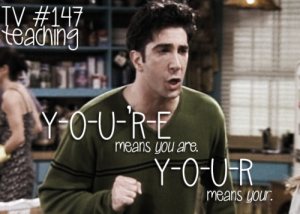



 Let me take this moment to say that I am not a so-called “grammar nazi”. I don’t prowl around message boards and comment threads pointing out the technical mistakes in people’s writing that don’t even detract from the content of their posts. I get that there’s a whole other written language for the Internet, the so-called “textese” consisting of abbreviated words and a bare minimum of capital letters that people are trained to understand through extensive use of chat programs and SMS, and that’s fine. The problem is when this language spills over into the “real world”. Abbreviations like “U”, “plz” and “thx” don’t belong outside of text messages and chat conversations, and they especially don’t belong in college assignments.
Let me take this moment to say that I am not a so-called “grammar nazi”. I don’t prowl around message boards and comment threads pointing out the technical mistakes in people’s writing that don’t even detract from the content of their posts. I get that there’s a whole other written language for the Internet, the so-called “textese” consisting of abbreviated words and a bare minimum of capital letters that people are trained to understand through extensive use of chat programs and SMS, and that’s fine. The problem is when this language spills over into the “real world”. Abbreviations like “U”, “plz” and “thx” don’t belong outside of text messages and chat conversations, and they especially don’t belong in college assignments.
Recent Comments